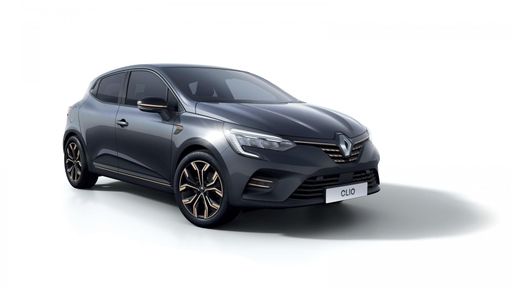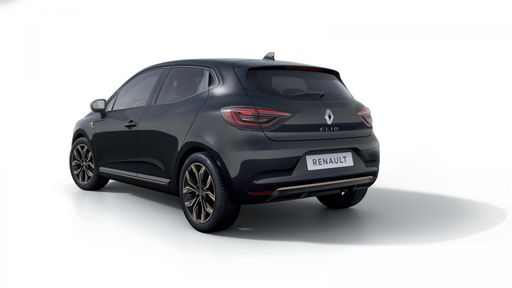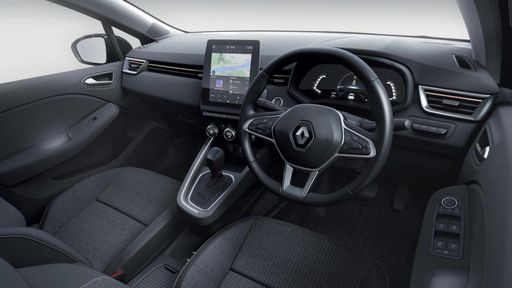Toyota Yaris Cross vs Renault Clio – Differences & prices compared
Compare performance, boot space, consumption and price in one view.
Find out now: which car is the better choice for you – Toyota Yaris Cross or Renault Clio?
The Toyota Yaris Cross (SUV) comes with a Full Hybrid engine and Automatic transmission. In comparison, the Renault Clio (Hatchback) features a Full Hybrid or Petrol engine with Automatic or Manuel transmission.
When it comes to boot capacity, the Toyota Yaris Cross offers 397 L, while the Renault Clio provides 391 L – depending on how much space you need. If you’re looking for more power, decide whether the 130 HP of the Toyota Yaris Cross or the 143 HP of the Renault Clio suits your needs better.
In terms of consumption, the values are 4.50 L per 100 km for the Toyota Yaris Cross, and 4.30 L for the Renault Clio.
Price-wise, the Toyota Yaris Cross starts at 23700 £, while the Renault Clio is available from 16600 £. Compare all the details and find out which model fits your lifestyle best!
In the small hatchback showdown, the Renault Clio impresses with its sleek design and efficient engine, making it ideal for urban driving. On the other hand, the Toyota Yaris Cross offers a more rugged appeal with its crossover build, and enhanced driveability with its higher ride height and available all-wheel drive. Both models boast advanced tech features, but the Yaris Cross edges out with its practicality and versatility for those seeking adventure beyond city limits.
Toyota Yaris Cross
The Toyota Yaris Cross combines the practicality of a compact SUV with the agility of a smaller car, making it ideal for urban adventures. Its elevated seating position offers excellent visibility, while the stylish design ensures it stands out on the city streets. Inside, the Yaris Cross boasts a modern interior with advanced technology features designed to enhance the driving experience.
details @ Toyota
@ Toyota
 @ Toyota
@ Toyota
 @ Toyota
@ Toyota
 @ Toyota
@ Toyota
 @ Toyota
@ Toyota
 @ Toyota
@ Toyota
 @ Toyota
@ Toyota
Renault Clio
The Renault Clio continues to impress with its sleek design and agile handling, making it a standout choice in the compact car segment. Inside, it offers a surprisingly spacious and comfortable cabin, crafted with high-quality materials that enhance the driving experience. Its fuel efficiency and reliable performance make it an attractive option for both city commuting and longer journeys.
details @ renault-presse.de
@ renault-presse.de
 @ renault-presse.de
@ renault-presse.de
 @ renault-presse.de
@ renault-presse.de
Urban Icons: Renault Clio vs. Toyota Yaris Cross
In the dynamic world of compact cars, two prominent contenders stand out—the agile and efficient Renault Clio and the versatile Toyota Yaris Cross. Both vehicles embed state-of-the-art technologies and are purpose-built for the urban landscape, offering unique features tailored for diverse consumer preferences.
Under the Hood: Engine and Performance
The Renault Clio offers a variety of engine types, including Full Hybrid, Petrol, and LPG options. It boasts power outputs ranging from 67 HP to a robust 143 HP, supported by 3- or 4-cylinder engines. Drivers can opt for either a Manual Gearbox or an Automatic gearbox, providing versatility in handling. Its acceleration from 0-100 km/h varies between 9.3 seconds and a more leisurely 17.1 seconds, depending on the powertrain chosen.
On the other hand, the Toyota Yaris Cross, with its Full Hybrid engine, simplifies choice by offering a focused performance range with 116 to 130 HP. Its engineering emphasizes fuel efficiency, with a consumption of 4.5 to 4.8 L/100km. Acceleration is commendable for an SUV, reaching 100 km/h in 10.7 to 11.3 seconds.
Dimensions: Space and Practicality
The Clio excels as a hatchback, with a length of 4053 mm, perfect for maneuvering through tight city streets. Its trunk offers a practical 301 to 391 liters of storage, which ensures ample room for daily errands or weekend getaways.
As an SUV, the Yaris Cross provides substantial presence with a length of 4180 mm. Despite its compact classification, it excels in offering a generous trunk capacity ranging from 320 to 397 liters, enabling it to meet both lifestyle and family needs.
Efficiency and Emissions
Emphasizing eco-friendliness, the Clio's varied engine lineup includes models with CO2 emissions as low as 97 g/km, placing it within CO2 Efficiency Classes C and D. Its fuel consumption spans from 4.3 to 7 L/100km, catering to those prioritizing frugality.
Competing closely, the Yaris Cross asserts itself with emissions ranging between 101 and 108 g/km, all classified under CO2 Efficiency Class C. Its streamlined fuel economy at 4.5 to 4.8 L/100km complements its eco-conscious design philosophy.
Driving Experience: Comfort and Innovation
The Renault Clio is known for its refined handling typically associated with hatchback models, making city driving intuitive and engaging. The Full Hybrid variant offers the added benefit of seamless transitions between power sources, optimizing energy use.
Toyota's Yaris Cross combines the elevated driving position of an SUV with the nimbleness of a compact vehicle, bolstered by its advanced hybrid system. The Continuously Variable Transmission (CVT) ensures smooth and continuous acceleration, enhancing urban driving comfort.
Concluding Remarks: Making the Choice
Ultimately, the decision between the Renault Clio and the Toyota Yaris Cross will hinge upon individual priorities. While the Clio offers diversified powertrains and compact practicalities ideal for city dwellers, the Yaris Cross's hybrid innovation and SUV stature appeal to those seeking a dash of adventure in city confines. Each promises a unique blend of performance, efficiency, and modernity, affirming their positions as urban icons.

|

|
|
|
|
Costs and Consumption |
|
|---|---|
|
Price
23700 - 34300 £
|
Price
16600 - 23000 £
|
|
Consumption L/100km
4.5 - 4.8 L
|
Consumption L/100km
4.3 - 5.3 L
|
|
Consumption kWh/100km
-
|
Consumption kWh/100km
-
|
|
Electric Range
-
|
Electric Range
-
|
|
Battery Capacity
-
|
Battery Capacity
0.60 kWh
|
|
co2
101 - 108 g/km
|
co2
97 - 121 g/km
|
|
Fuel tank capacity
36 L
|
Fuel tank capacity
39 - 42 L
|
Dimensions and Body |
|
|---|---|
|
Body Type
SUV
|
Body Type
Hatchback
|
|
Seats
5
|
Seats
5
|
|
Doors
5
|
Doors
5
|
|
Curb weight
1180 - 1290 kg
|
Curb weight
1124 - 1331 kg
|
|
Trunk capacity
320 - 397 L
|
Trunk capacity
301 - 391 L
|
|
Length
4180 mm
|
Length
4053 mm
|
|
Width
1765 mm
|
Width
1798 mm
|
|
Height
1595 mm
|
Height
1440 mm
|
|
Payload
485 - 510 kg
|
Payload
398 - 406 kg
|
Engine and Performance |
|
|---|---|
|
Engine Type
Full Hybrid
|
Engine Type
Full Hybrid, Petrol
|
|
Transmission
Automatic
|
Transmission
Automatic, Manuel
|
|
Transmission Detail
CVT
|
Transmission Detail
Automatic Gearbox, Manual Gearbox
|
|
Drive Type
Front-Wheel Drive, All-Wheel Drive
|
Drive Type
Front-Wheel Drive
|
|
Power HP
116 - 130 HP
|
Power HP
67 - 143 HP
|
|
Acceleration 0-100km/h
10.7 - 11.3 s
|
Acceleration 0-100km/h
9.3 - 17.1 s
|
|
Max Speed
170 km/h
|
Max Speed
160 - 174 km/h
|
|
Torque
-
|
Torque
95 - 205 Nm
|
|
Number of Cylinders
3
|
Number of Cylinders
3 - 4
|
|
Power kW
85 - 96 kW
|
Power kW
49 - 105 kW
|
|
Engine capacity
1490 cm3
|
Engine capacity
999 - 1598 cm3
|
General |
|
|---|---|
|
Model Year
2024 - 2025
|
Model Year
2023 - 2025
|
|
CO2 Efficiency Class
C
|
CO2 Efficiency Class
C, D
|
|
Brand
Toyota
|
Brand
Renault
|
Toyota Yaris Cross
Discovering the Toyota Yaris Cross: The Compact SUV Redefined
The Toyota Yaris Cross has boldly entered the compact SUV market, sporting a blend of sleek aesthetics, advanced hybrid technology, and practical functionality. As urban driving dynamics evolve, this vehicle meets the demands of modern motorists with an impressive performance and eco-friendly technology, setting itself apart in a bustling segment.
Performance and Efficiency: Hybrid Innovation at Its Best
The Yaris Cross is designed to provide an engaging driving experience combined with remarkable efficiency. At its heart lies a full hybrid powertrain, offering options between 116 PS and 130 PS, efficiently paired with Toyota's CVT automatic transmission. The hybrid system seamlessly integrates a petrol engine with an electric motor, optimising power delivery and responsiveness.
Drivers will appreciate the low fuel consumption, which ranges from 4.5 to 4.8 litres per 100 km, and equally impressive CO2 emissions of 101 to 108 g/km, aligning with the industry's ongoing commitment to sustainability.
Design and Dimensions: Compact Yet Spacious
The Yaris Cross offers a perfect blend of compact design and interior spaciousness, making it an ideal choice for urban environments. Measuring 4,180 mm in length, 1,765 mm in width, and 1,595 mm in height, the vehicle manages to provide a refined SUV stature without sacrificing manoeuvrability.
Its five-door layout and flexible boot space, ranging from 320 to 397 litres, make it practical for everything from city commutes to weekend getaways. The increased ride height adds to the SUV appeal, providing drivers with that coveted higher driving position and improved visibility.
Advanced Technology and Features
The Toyota Yaris Cross is well-equipped with an array of technological features, defined by its various trim levels including the Business Edition CVT, Comfort CVT, and the sporty GR Sport CVT. Each model is crafted to cater to diverse consumer needs, whether one prioritises enhanced comfort, sporty aesthetics, or comprehensive safety features.
Key innovations include a state-of-the-art infotainment system, advanced driver assistance features, and the Toyota Safety Sense package that enhances driver confidence through adaptive cruise control, lane keep assist, and more.
Driving Experience: Safety and Comfort in Focus
The Yaris Cross is not just about performance but also ensures safety and comfort for all occupants. The vehicle offers a smooth and quiet ride thanks to its refined suspension system and cleverly designed cabin, reducing noise and vibration levels.
The advanced safety suite within the Yaris Cross, encompassing multiple airbags, stability control, and a host of driver assistance systems, is designed to provide protection and peace of mind, every time you step into the driver's seat.
Conclusion: A New Benchmark in the Compact SUV Segment
The Toyota Yaris Cross stands as a testament to Toyota's commitment to producing environmentally friendly vehicles without compromising on performance or style. It strikes a harmonious balance between innovation, efficiency, and practicality, offering consumers a compact SUV that is both exciting to drive and easy to live with.
As we move further into an era of hybrid advancements and smarter automotive solutions, the Yaris Cross embodies these principles exceptionally, proving to be a robust and reliable partner for the modern driver.
Renault Clio
Introduction to the Renault Clio
The Renault Clio, a popular choice among compact cars, has continually advanced its design and technology to maintain a strong position in the automotive market. With enhancements in engineering, efficiency, and aesthetic appeal, the Clio remains a top contender in the hatchback category.
Advanced Hybrid Technology
The Renault Clio's hybrid technology is one of its standout features. The E-Tech Hybrid system optimises both performance and efficiency, offering a seamless transition between electric and fuel-powered driving. This setup results in an impressive fuel consumption rate of 4.3 L/100km, making it an attractive option for eco-conscious drivers.
Efficient Engine Options
Renault offers a variety of engine choices for the Clio, accommodating different driving styles and preferences. From the economical SCe 65 manual variant to the powerful TCe 100 LPG gas version, each option is engineered to balance performance with fuel efficiency. With outputs ranging from 67 to 143 PS, drivers can enjoy a tailored driving experience.
Design and Comfort
The Renault Clio stands out with its sleek and modern design, characterized by its hatchback body style. The interior boasts an ergonomic layout with seating for five, ensuring passenger comfort and convenience. With a boot capacity of 301 to 391 litres, the Clio also offers practical storage solutions for everyday use.
Safety and Innovation
Safety is a key priority for Renault, and the Clio reflects this commitment with its suite of innovative safety features. Advanced driver-assistance systems are integrated throughout, enhancing both safety and usability. The Clio encompasses features like lane departure warning, automatic emergency braking, and adaptive cruise control.
Cost Efficiency and Environmental Impact
The Renault Clio not only offers affordability with pricing ranging from €18,450 to €26,800, but also promises low running costs. With CO2 emissions between 97 and 130 g/km, the Clio fits well within the C and D efficiency classes. This makes it a cost-effective and environmentally friendly choice for modern drivers.
Conclusion
Renault Clio remains a dynamic, dependable and economical option in the compact car segment. With its innovative technologies, diverse engine options, and commitment to safety and design, the Clio continues to impress and adapt to the evolving demands of the automotive world.
What drive types are available for the Toyota Yaris Cross?
The Toyota Yaris Cross is available as Front-Wheel Drive or All-Wheel Drive.
The prices and data displayed are estimates based on German list prices and may vary by country. This information is not legally binding.
